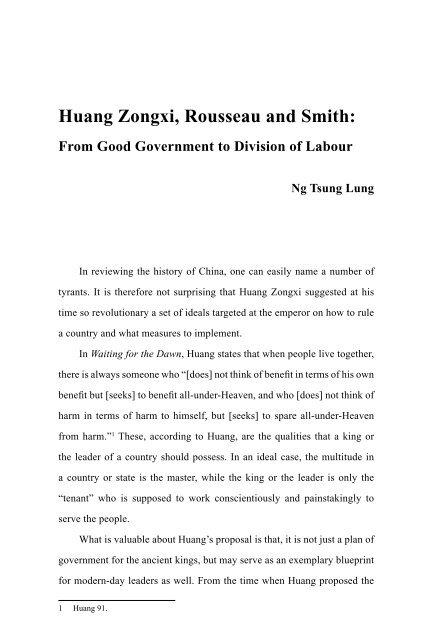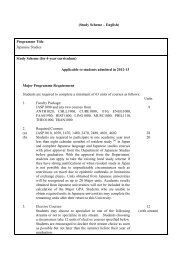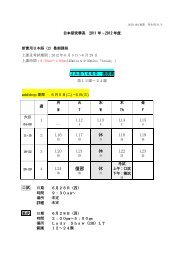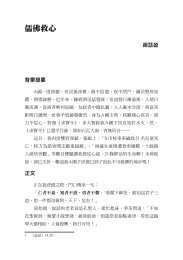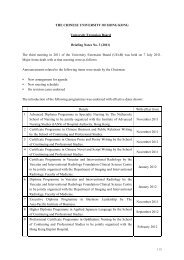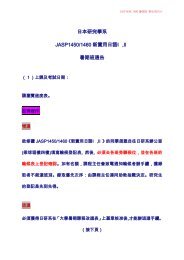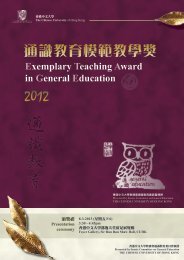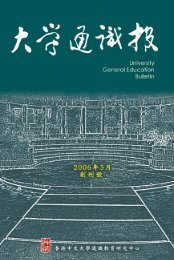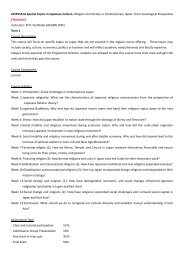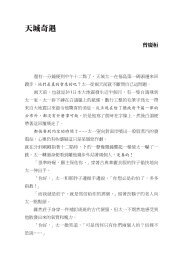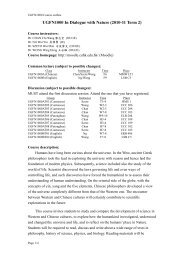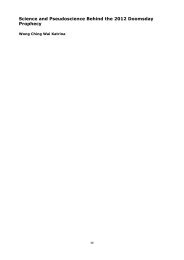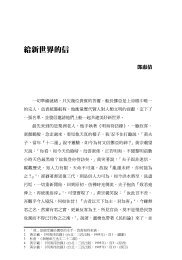Huang Zongxi, Rousseau and Smith
Huang Zongxi, Rousseau and Smith
Huang Zongxi, Rousseau and Smith
Create successful ePaper yourself
Turn your PDF publications into a flip-book with our unique Google optimized e-Paper software.
<strong>Huang</strong> <strong>Zongxi</strong>, <strong>Rousseau</strong> <strong>and</strong> <strong>Smith</strong>:From Good Government to Division of LabourNg Tsung LungIn reviewing the history of China, one can easily name a number oftyrants. It is therefore not surprising that <strong>Huang</strong> <strong>Zongxi</strong> suggested at histime so revolutionary a set of ideals targeted at the emperor on how to rulea country <strong>and</strong> what measures to implement.In Waiting for the Dawn, <strong>Huang</strong> states that when people live together,there is always someone who “[does] not think of benefit in terms of his ownbenefit but [seeks] to benefit all-under-Heaven, <strong>and</strong> who [does] not think ofharm in terms of harm to himself, but [seeks] to spare all-under-Heavenfrom harm.” 1 These, according to <strong>Huang</strong>, are the qualities that a king orthe leader of a country should possess. In an ideal case, the multitude ina country or state is the master, while the king or the leader is only the“tenant” who is supposed to work conscientiously <strong>and</strong> painstakingly toserve the people.What is valuable about <strong>Huang</strong>’s proposal is that, it is not just a plan ofgovernment for the ancient kings, but may serve as an exemplary blueprintfor modern-day leaders as well. From the time when <strong>Huang</strong> proposed the1 <strong>Huang</strong> 91.
98 Can we be happy together?plan to the present day, despite the long period of history that has elapsed(around three-<strong>and</strong>-a-half centuries) <strong>and</strong> however large the increase in thecomplexity of human society <strong>and</strong> of many aspects of life, the role of a leaderis invariably to ensure the well-being of the people by, as Fan Zhongyan 2puts in his famous line, “feeling worried before all-under-Heaven starts toworry, <strong>and</strong> feeling happy after all-under-Heaven has rejoiced.” 3Having so said, it would be apt to provide a contemporary example toillustrate how a leader may fail to achieve this, <strong>and</strong> how he only “extractsthe very marrow from people’s bones, <strong>and</strong> takes away their sons <strong>and</strong>daughters to serve his own debauchery.” 4 Zimbabwe, a South Africancountry, is known for its human right abuses <strong>and</strong> ever-crumbling economy,with the country suffering from a hyperinflation of 89.7 sextillion (10 21 )percent (as of 14 Nov 2008) 5 <strong>and</strong> serious unemployment. What is moreappalling is that, the President, Robert Mugabe, <strong>and</strong> the First Lady, GraceMugabe, live in extreme luxury. Instead of devising urgent plans to salvagethe country <strong>and</strong> getting through the hard times with the people, they buildlavish villas <strong>and</strong> purchase world-class Mercedes-Benz limousine, amongother extravagant acquisitions. The wife goes on regular shopping spreesdespite the catastrophic poverty of the common people. This whole picturematches very well with what <strong>Huang</strong> describes as a tyrant.Therefore, an important prerequisite for maintaining the social <strong>and</strong>economic well-being of a country is a good leader who does care for the2 范 仲 淹 .3 In Chinese: “ 先 天 下 之 憂 之 憂 , 後 天 下 之 樂 而 樂 ”.4 <strong>Huang</strong> 92.5 Hanke, “New Hyperinflation Index (HHIZ) Puts Zimbabwe Inflation at 89.7 sextillionpercent.”
Ng Tsung Lung, <strong>Huang</strong> <strong>Zongxi</strong>, <strong>Rousseau</strong> <strong>and</strong> <strong>Smith</strong> 99people <strong>and</strong> serves them wholeheartedly. For <strong>Huang</strong>, the ideal governmentis one that is for the people, but Jean-Jacques <strong>Rousseau</strong> takes it further toargue for a government that is also of <strong>and</strong> by the people. In his book TheSocial Contract, <strong>Rousseau</strong> places great importance on the general will ofthe populace, or the Sovereign, as he calls it. A perfect society would beone which is controlled by this general will, <strong>and</strong> the government, which isseparate from the Sovereign, is only responsible for executing its will. Thisidea is different from <strong>Huang</strong>’s proposal—while <strong>Rousseau</strong> believes that inthat the multitude are entitled to participate in politics, <strong>Huang</strong> only favorsa virtuous king to rule over them. In other words, <strong>Rousseau</strong> advocates aform of government that is by the people, or democratic, as our present-dayunderst<strong>and</strong>ing would call it. <strong>Rousseau</strong> begins the Social Contract by statingthat “man is born free,” but “everywhere he is in chains.” 6 Therefore, byentering this Sovereignty, one, “while uniting himself with all, may stillobey himself alone, <strong>and</strong> remain as free as before.” 7 This, according to<strong>Rousseau</strong>, is what the social contract is for.<strong>Rousseau</strong>’s political proposal does have its legacy in the modern world.Today, democracy has become the name of the game in many countries.With democracy, people are entitled to active participation in politics, <strong>and</strong>to freely elect those whom they trust <strong>and</strong> on whom the political power canbe conferred. This means a way to effectively monitor the governmentbecause by voting, people can decide who is capable <strong>and</strong> thus who canrepresent them in the government, <strong>and</strong> take down those who are no longer“worth their salt.” Ideal as it may sound, democracy does not come without6 <strong>Rousseau</strong> 10.7 <strong>Rousseau</strong> 18.
100 Can we be happy together?a cost. It has taken its toll in places like Europe where, for example, theunemployment rate st<strong>and</strong>s high <strong>and</strong> all-encompassing social welfare oftenturns out to encourage regular labor strikes. The same is true in the UnitedStates <strong>and</strong> Canada where good social welfare <strong>and</strong> healthcare systemscontribute to national deficit every year.One can conclude that no system alone is flawless <strong>and</strong> perfect.However, if we consider <strong>Huang</strong>’s <strong>and</strong> <strong>Rousseau</strong>’s plans again, despite theirdifference in the point of focus, their combination—<strong>Huang</strong>’s meritocraticplan to complement <strong>Rousseau</strong>’s democratic plan—can make a bettersolution. For example, though a democratic government allows a freeelectoral system, politicians, in order to gain support from a certain sector,always makes many promises to members of that sector but overlook thosefrom other sectors, giving rise to an uneven distribution of social resources.An example is that labor parties always put forward policies to secure theinterest of laborers, while conservative policies aim to protect interests ofthe upper class or business people. With the kind of leader which <strong>Huang</strong>advocates, however, he will endeavor to ensure everyone is treated fairlyirrespective of their social class, as “all-under-Heaven is not one’s possession,but all’s” 8 , or “of the people.” In this way, justice for all can be achieved asmuch as possible.In addition to an ideal <strong>and</strong> stable political environment, a certain degreeof economic prosperity is needed for people’s well-being. One of the factorscontributing to such prosperity, according to Adam <strong>Smith</strong>, is the practice ofdivision of labor. In The Wealth of Nations, the Scottish economist shows that“the greatest improvement in the productive powers of labor . . . seem[s] to8 The original reads : “ 天 下 非 一 人 之 天 下 , 乃 天 下 人 之 天 下 ”.
Ng Tsung Lung, <strong>Huang</strong> <strong>Zongxi</strong>, <strong>Rousseau</strong> <strong>and</strong> <strong>Smith</strong> 101be the effects of the division of labor.” 9 His discussion is indeed convincingwith the famous example of pin-making, <strong>and</strong> with the reasons he providedto explain why specialization leads to increased productivity: increaseddexterity, time saved in moving around between tasks <strong>and</strong> mechanization.Though <strong>Smith</strong>’s discussion is not from a macroscopic point of view, itis remarkable that division of labor actually applies to the whole world,where, for example, Japan <strong>and</strong> Germany specialize in electronics <strong>and</strong> heavyindustry, Malaysia in rubber production, Silicon Valley in IT, etc.However, by specialization, one always produces more than one needs.And as they specialize in producing one or a few products, they naturallyneed an external supply of what is not produced. In other words, producinglarge quantities is not truly “productive” unless the surplus ends up in h<strong>and</strong>swhich need it <strong>and</strong> value it. It is thus significant that <strong>Smith</strong> also points outsthat the advantages of division of labor can only be fully realized whenpeople co-operate, i.e. when they exchange.Convincing though <strong>Smith</strong>’s discussion is, he does not go on to expoundhow to effectively divide labor—is the division arbitrary <strong>and</strong> r<strong>and</strong>om orbased on some kind of criteria? That is to say, in what way should laborbe divided so as to truly raise productivity to a potential maximum?Bringing this question into today’s economics, the concept of “comparativeadvantage” can be an answer. Imagine on an isolated isl<strong>and</strong>, there live twomen, one of whom is young, strong <strong>and</strong> fast in working while the other isold, weak <strong>and</strong> slow. The young one has an absolute advantage in producinggoods (or generally, carrying out economic activities) while the old manhas an absolute disadvantage. However, the young man will not take up9 <strong>Smith</strong> 128.
102 Can we be happy together?all modes of production; they will still specialize <strong>and</strong> exchange. Althoughthe young man has an absolute advantage in all productions, he would onlyproduce those items in which he has a comparative advantage, <strong>and</strong> so wouldthe old man. In this way, the total productivity is higher when both menspecialize than when only the young man produces. Using economic terms,comparative advantage is the advantage to produce something at a loweropportunity cost than other producers. Given limited resources, a countrymust specialize, <strong>and</strong> specialize only in the production of items in which itenjoys the highest comparative advantage.However, things are always multi-faceted <strong>and</strong> division of labor is notwithout its drawbacks. Some such drawbacks have already been extensivelydiscussed, such as over-dependence of one production on other kinds ofproduction, monotony on the workers’ part <strong>and</strong> their increased occupationalimmobility, among others. But as for how it affects human character,one can say it encourages the shirking of responsibility. Imagine howannoying it would be when sometimes you make an inquiry or complaintto department A of the government, but only end up having this departmentsaying it is not their job <strong>and</strong> directing your problem to department B, <strong>and</strong>again department B shirking <strong>and</strong> passing the problem to department C, <strong>and</strong>so on. People think they only specialize in one area of work <strong>and</strong> so donot concern themselves with other areas at all. The famous linguist NoamChomsky has remarked, “(Not) many people get to the point hundreds ofpages later, where he [Adam <strong>Smith</strong>] says that division of labor will destroyhuman beings <strong>and</strong> turn people into creatures as stupid <strong>and</strong> ignorant as it ispossible for a human being to be.” 10 Division of labor is of course useful to10 Chomsky 20.
Ng Tsung Lung, <strong>Huang</strong> <strong>Zongxi</strong>, <strong>Rousseau</strong> <strong>and</strong> <strong>Smith</strong> 103us in many ways—it has been applied extensively from manufacturing toadministrations in virtually all occupations—but still it should not be takento the extreme in any case, where everyone works in isolation <strong>and</strong> is devoidof communication with or knowledge of their fellows.The three classics discussed above have generally offered some goodadvice on how people’s justice <strong>and</strong> economic prosperity can be achieved.Yet, it is important that today’s leaders or authorities do not followthem blindly, but take their true meanings <strong>and</strong> incorporate them into thecontemporary world with necessary modifications. It is in this sense thatthese classics are truly of great value to us.ReferencesChomsky, Noam. Class Warfare: Interviews with David Barsamian.London: Pluto Press, 1996.<strong>Huang</strong>, Tsung-hsi. Waiting for the Dawn: A Plan for the Prince. Tr. Wm.Theodore de Bary. New York: Columbia U P, 1993.Hanke, Steve H. “New Hyperinflation Index (HHIZ) Puts ZimbabweInflation at 89.7 Sextillion Percent.” The Cato Institute. 26 April 2009.<strong>Rousseau</strong>, Jean-Jacques. The Social Contract. Tr. G.D.H. Cole, Lexington:BN Publishing, 2007.<strong>Smith</strong>, Adam. “Wealth of Nations [Selection].” In The Great Books <strong>and</strong>Reading <strong>and</strong> Discussion Program: Second Series. Volume 2. Chicago:The Great Books Foundation, 1985.


